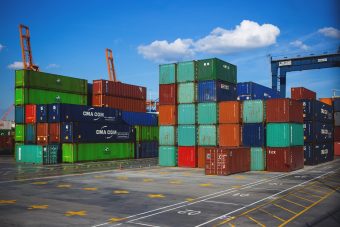
Many of the world’s biggest shipowners and charterers have called on heads of state to take swift action to force carbon emission cuts on their industry which is the only sector in the world not now bound by climate change targets.
Maersk, Cargill, the Global Shippers’ Forum and 45 other shipping organisations including the Danish Shipowners’ Association said “ambitious” action is needed at a key UN meeting in London next week to bring shipping into line with the world’s 195 countries, all of which have signed up to the Paris climate agreement to curb emissions.
“It is time to recognise the important role which the global shipping industry must play in holding global temperatures well below 2C,” the coalition told the UN’s International Maritime Organisation (IMO).
“Shipping’s emissions are expected to substantially increase over the coming years. To curb this trajectory, IMO countries must demonstrate that they can match the ambition and pace of the UN climate body, the UNFCCC [which oversaw the Paris deal],” say the “progressive” shippers in a letter.
Shipping’s emissions, which stand at around round 1,000m tonnes of CO2 a year, compared to about 781m from aviation, are forecast to rise to nearly 17% of the world’s total over the next 30 years if left unregulated.
But the industry, which carries much of the world’s goods, is the only economic sector not now subject to any treaty on climate change, country-by-country emissions controls or reduction targets of any kind – even though it emits around 3-4% of global gas emissions and has a carbon footprint the size of Germany’s.
Aviation agreed a weak emissions-reduction scheme last month in Montreal, leaving shipping and the IMO exposed and appearing to drag its heels.
“The IMO and the industry needs to act fast. Shipping emissions are forecast to rise by 50-250% by 2050 if unchecked. The IMO sticks out like a sore thumb,” said a spokesman for Transport & Environment, a Brussels-based NGO.
To secure an agreement, the IMO and the progressive shippers will have to overcome strong opposition from some developing countries with major shipping interests as well as lobbying by powerful fossil fuel groups and trade associations. These argue for a global CO2 monitoring scheme to be set up before any agreement is made on reductions.
Led by China, Brazil and some small island states like the Cook Islands, one group has argued in IMO meetings that because shipping is a truly international industry, it cannot be regulated in the same way as countries, and must not be rushed into cuts. It says the world’s 100,000 big ships have already reduced emissions considerably but more data and analysis is needed.
“Until the IMO CO2 data collection system is up and running, there is insufficient data to determine whether or not it would be realistic for IMO to adopt a firm contribution on behalf of the sector,” says a group which includes the Baltic and International Maritime Council, Intercargo and Intertanko in a paper submitted to the IMO.
They and others fear that a tax on fuel or emissions, or a cap, could vastly increase fuel costs in a sector already suffering an economic downturn.
But the progressives, who are backed by the powerful International Chamber of Shipping – the international trade association for merchant shipowners – say enough information about CO2 emissions is known and an early decision on a timeline for reductions should be agreed in London next week.
The coalition is backed by a further 19 companies in the the Sustainable Shipping Initiative (SSI) which last week also urged the IMO to reflect the Paris agreement’s objective of keeping global warming below 2C. The body proposes a detailed roadmap for establishing shipping’s “fair share” of global emission reductions.
“This should lead to the swift establishment of reduction targets which should be submitted to the UNFCCC. Defining shipping’s ‘fair share’ of CO2 reductions must be balanced between the required ambition to deliver on the Paris Agreement, and the need to be equitable and affordable for the industry, as well as enforceable on a global basis to ensure change,” said the SSI.
The influence of lobbyists is expected to be key in the meeting. They have traditionally been able to pressure some shipping-dependent countries who operate flags of convenience and ship registration schemes to water down, delay or dismiss action on reducing pollution or emissions.
Leaked documents seen by the Guardian show that the Pacific Cook Islands this year reversed the progressive position it took on climate change in Paris last year, to lead opposition in the IMO to emissions cuts being imposed. The documents showed the country’s negotiator claimed this would hurt small island developing countries the most, even though the Cook Islands are low-lying and vulnerable to sea-level rise and climate change.
“Shipping must be profitable and has to keep growing to survive. Any notion on imposing a system that would increase transport cost and availability of freight even further would be extremely detrimental to [least developed countries] and SIDS [small island developing states] and severely impact on our economic security while inhibiting growth and development potential”, the Cook Islands negotiator said.
He would not even countenance the setting up a working group to talk about cuts. “To be honest I am staggered that this was even suggested,” he said.
The meeting will also decide whether to impose a global cap on SOx emissions from 2020 or 2025. This would see sulphur emissions fall from the current maximum of 3.5% of fuel content to 0.5%.
Although cars and land-based industries have greatly reduced pollution, shipping has been allowed to continue burning some of the dirtiest fuels in the world, thousands of times more polluting than the fuel used in cars.
Source: theguardian.com



